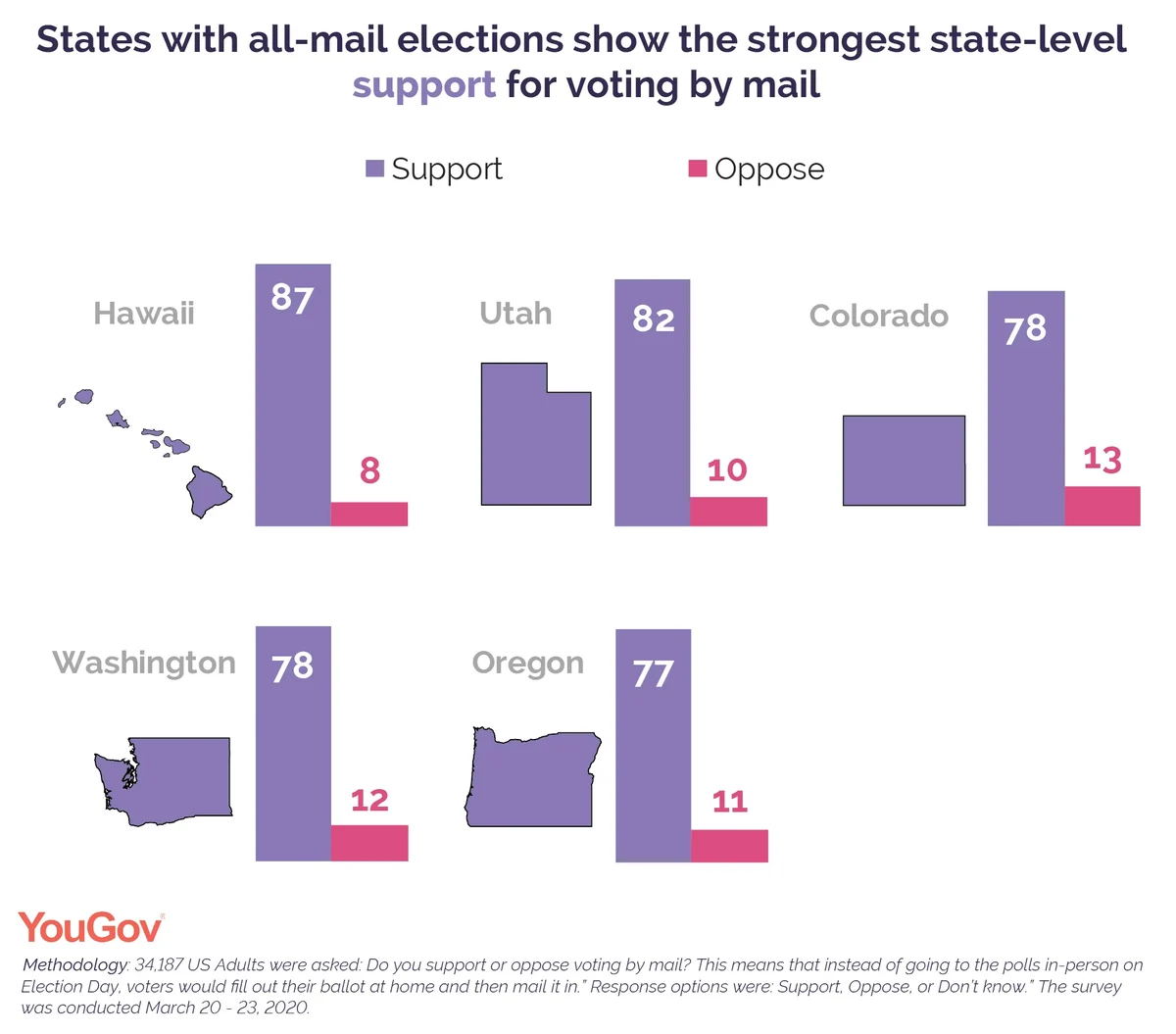As the COVID-19 epidemic spreads across the United States and makes in-person voting precarious, a YouGov poll finds that the majority of Americans (65%) support voting-by-mail. The idea of all-mail elections garners bipartisan support, and it is especially popular in states where it is already implemented.
YouGov asked more than 34,000 Americans whether they support or oppose voting-by-mail, a provision that would mean that instead of going to the polls in-person on Election Day, voters would fill out their ballot at home and then mail it in. The poll was conducted in late-March—as states postponed primary elections because of concerns that COVID-19 would spread where people gathered to vote.
Amid the COVID-19 outbreak, demands for vote-by-mail expansion are rising. Minnesota Senator Amy Klobuchar co-sponsored a bill that would expand early in-person voting and no-excuse absentee voting to all states, among other provisions like offering prepaid postage and more lenient deadlines. Some states, like Georgia, will mail all active voters absentee ballot request forms ahead of their May 19 primary. Other states, like Wisconsin, faced a record number of absentee ballot requests that resulted in some voters not receiving their ballots with enough time to return them.
Even as experts warn that hasty implementation of mail-in ballots could result in more chaos, YouGov data shows that most states support the policy.
States with all-mail elections support it
Five states already conduct all of their elections by mail—Colorado, Hawaii, Oregon, Utah, and Washington. In these five states, the levels of support for vote-by-mail elections are the highest among all states surveyed. Nearly nine in ten Hawaiians (87%) support voting by mail, along with more than three-quarters of those in Utah (82%), Colorado (78%), Washington (78%), and Oregon (77%).

No-excuse absentee voting
Most US states—while still administering in-person elections—allow residents to request a mail-in absentee ballot for any reason. According to the National Conference of State Legislatures, 33 states and Washington, D.C., offer mailed ballot voting where citizens do not need a reason to request a mailed ballot.
Many of those 33 states still carry more than two-thirds of support for vote-by-mail policies, including Montana (77%), Arizona (74%), Wisconsin (73%), California (71%), Michigan (71%), Ohio (70%), Kansas (68%), Florida (68%), Illinois (67%), Nebraska (67%), and Iowa (67%).
Most other states still carry a majority of citizen support for mail-in ballots. Kentucky (50%), Mississippi (49%), and Alabama (47%) are the only two states surveyed that do not have a majority of support for vote-by-mail policies. One-third of Alabamans (33%) oppose mail-in ballots, and one in five (20%) are unsure of their opinion.
Democrats and Republicans support voting by mail
A majority of Democrats (80%), Independents (64%), and Republicans (54%) support voting by mail. Americans who consider themselves “very conservative” are the most uncertain about all-mail ballots—47 percent support the idea, and 40 percent oppose it. US Adults who consider themselves “very liberal” overwhelmingly support the measure—85 percent support it and 8 percent are opposed.
The hurdles of voting by mail
Even as Americans support the idea of voting by mail, there would be complications in implementing it. While mail-in ballots are popular, a ProPublica investigation found that they may be most vulnerable to fraud. Different types of election infrastructure are also necessary to process mailed ballots, a transition that could take several months or years.
See the toplines from this Daily Agenda question, and contact uspress@yougov.com for additional crosstabs
Methodology: The total weighted sample size was 34,187 US Adults aged 18+. Participants were asked, “Do you support or oppose voting by mail? This means that instead of going to the polls in-person on Election Day, voters would fill out their ballot at home and then mail it in.” Response options were: Support, Oppose, or Don’t know.” The survey was conducted from March 20 - 23, 2020. The responding sample is weighted to provide a representative sample of the United States.
Image: Getty










